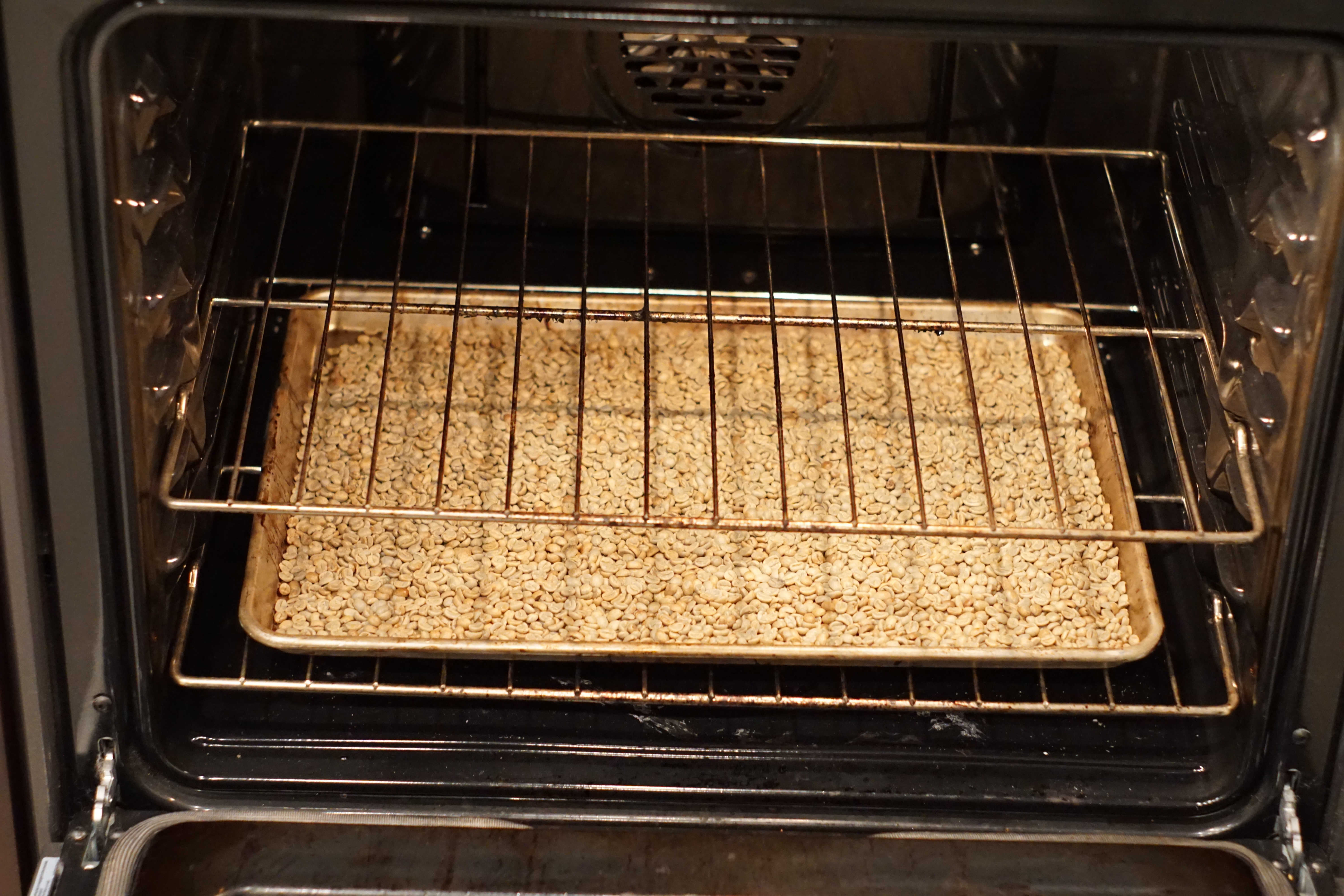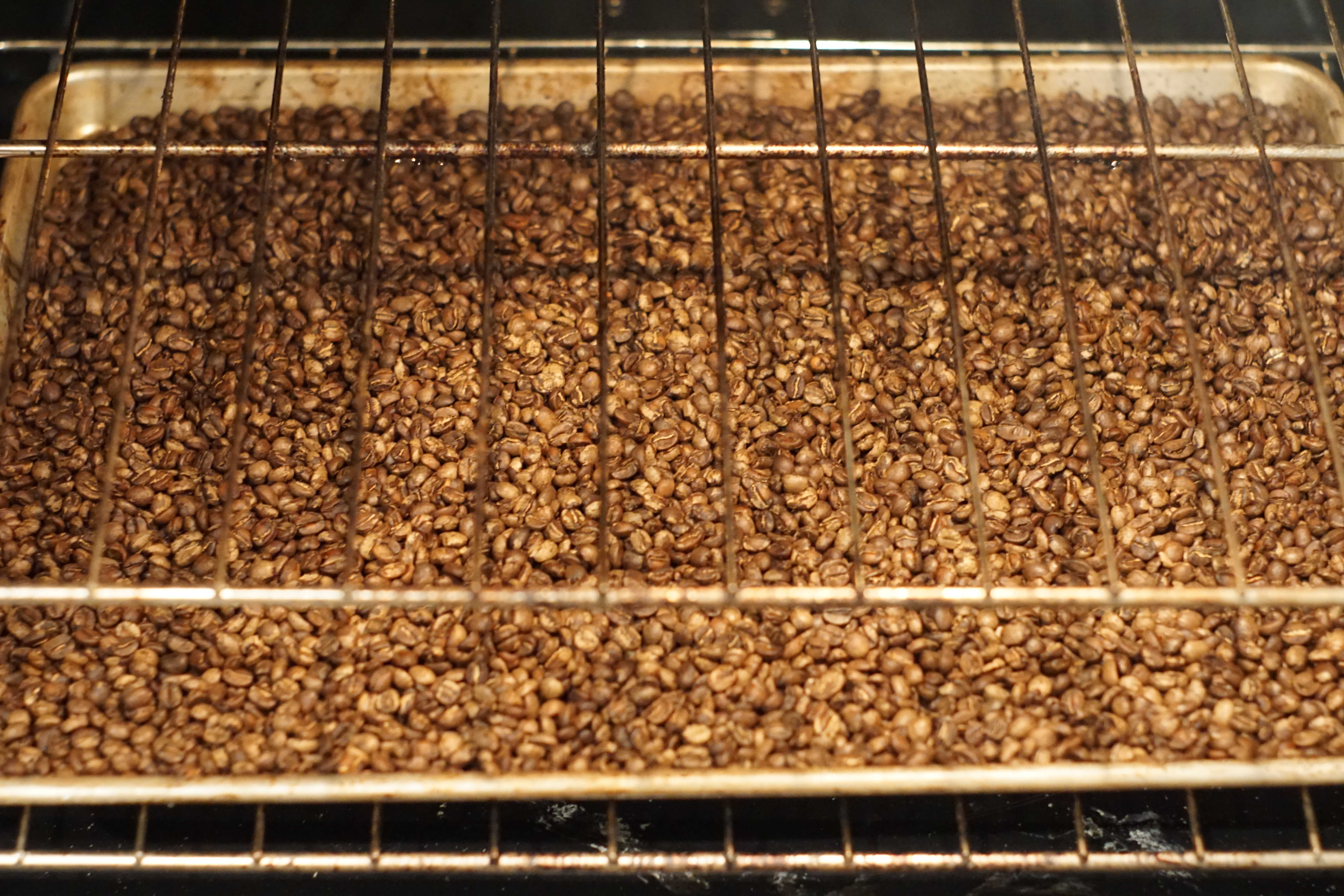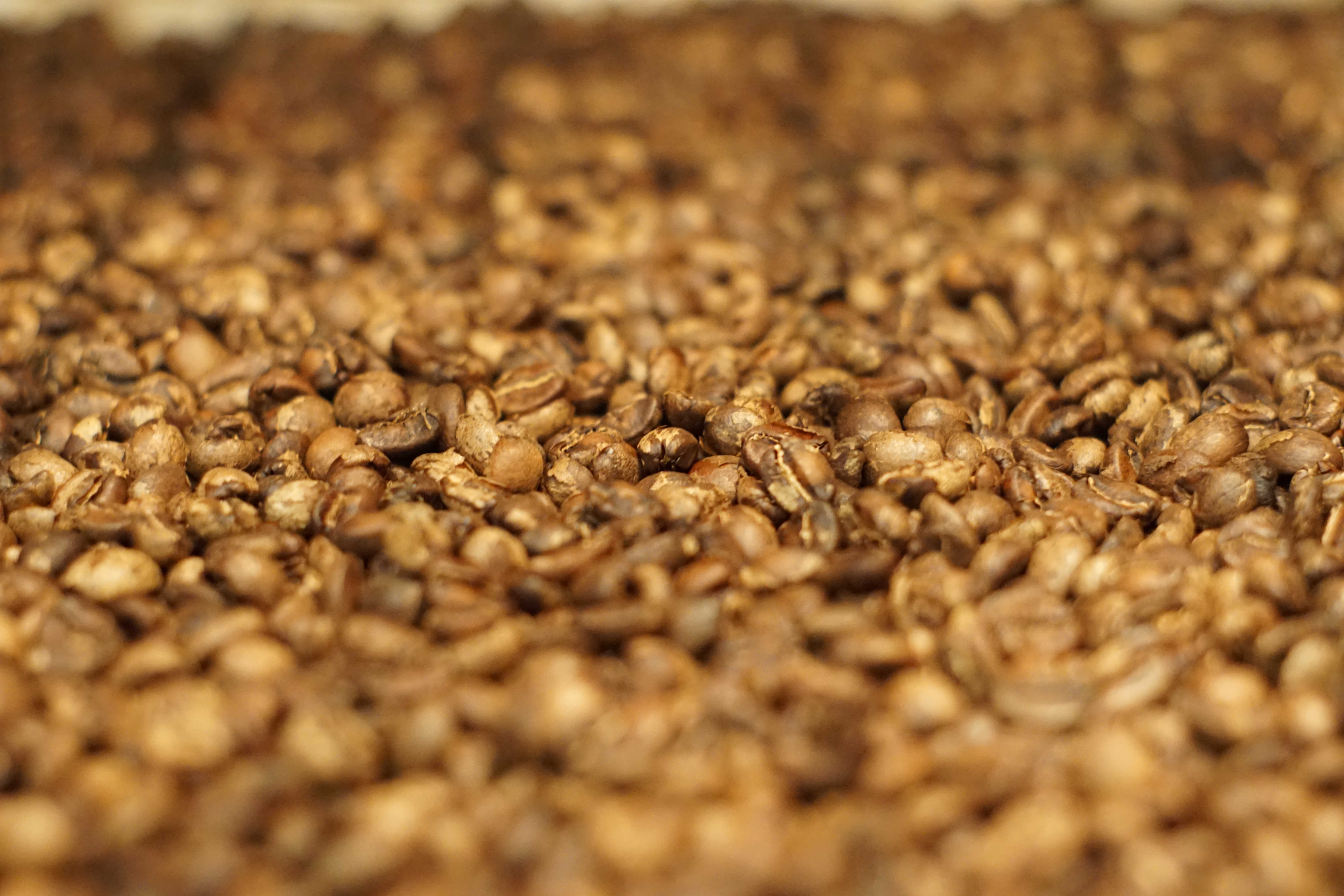Are there any other home-roasters in the community? I live in an area where the commercially available coffee tends to be pre-ground and stale. Over the years, I’ve started roasting my own coffee. Feel free to chime in to this post if you do the same or if you’re curious about it and we can compare notes on technique!
Oven-Roasted Coffee
Health and Safety Tip: You should only attempt this method if your kitchen is well-ventilated or if you have easy access to a closed circuit, self-contained breathing apparatus. Seriously. Smoke is a natural byproduct of the roasting process and you’re going to have to deal with it somehow. Consider turning off your smoke detectors during the roast. Open all of the windows. Learn to love the intense smell of freshly-roasted coffee because it will stick with you much longer than the smoke does.
Time: How long do you want your coffee roast to take? I personally don’t care. I want an even roast with minimal or no manual intervention. Using the bottom rack of my oven results in the most even roast at a temperature range of 380 to 415 degrees Fahrenheit. For this demonstration, I’ve set the oven at 385F for two reasons. First, this extends the roasting time so I can easily show you the roast level over time. Second, I get the best consistency of roast at this temperature. Even if it takes a while, I don’t have to stir the beans and I can wander off and do other things while I wait. If you are in a hurry, increase the temperature and stir as needed. Onward to the process!
Process Overview: I use a large baking pan. For the beans, I get 20-pound bags of coffee from Sweet Maria’s. Different beans behave differently when roasted. I routinely get Costa Rican beans because I like the taste and I want to eliminate variables. This batch is tagged as Costa Rica Honey Palmichal Vecindario.

I preheat the oven and use the bottom rack. My oven has a convection bake option, which makes the temperature more even throughout the oven, but especially at the bottom rack level. A friend of mine has a very similar oven (Same brand, same production year), but he gets better results without convection and by placing his coffee on the middle rack. Ovens differ, so you may need to tweak the settings for your hardware.
At this temperature (385F), we have some waiting to do. I have some pictures below at 20 min through 45 min to show the gradual progression of the process. It is easier to see the progress if you zoom in on the pictures.
Start

20 min

Note how some of the beans on the edges appear to be roasting faster than beans further away from the walls of the pan. At higher temperatures, this effect is much more pronounced. At this heat level, it all evens out eventually.
30 min

40 min

45 min


Oven lights are not ideal for photography. Here is a picture of the beans cooling outside in natural light.

The chaff doesn’t burn at this roast temperature, so it remains on the bean and I make no effort to remove it. I now have enough roasted coffee to service my caffeine addiction for several days!

Those are very long roast times I’d be concerned that you might see some over development which can cause the coffee to come out being more of a one note flavor with less depth and less acidity.
I’d like to hear your tasting notes on coffee you roasted with this process cause I’ve not experimented with longer roasts very much so I could be completely wrong.
Here’s a follow-up thought that you can take or leave. Having tried both head to head, I think that there is a flavor difference between what I do with my oven and a good high-temp low-time roast. Personally I think that the difference is minor, especially when you compare the flavor of either method to most of the coffee that you can buy from a grocery store. I suspect that the high-temp low-time issue is emphasized online because (if it is accepted as both true and important) it favors the purchase of specialty gadgets. Please try both and draw your own conclusions.

Thanks a bunch for sharing the perspective and experience I’ve thought this might be the case since I’ve discovered it to be the case in so many other areas of the coffee hobby so far.
I could be wrong, depending on your sense of taste. Once I cross the divide between bad coffee and good coffee, my ability to be a nuanced critic of flavor takes a nosedive.
I like how it turns out using this method, although I suspect that there might be some bean varieties where it wouldn’t work out. I tend to brew with a moka pot and the resulting cup has a delightful depth to it. You can cut the time considerably by raising the oven temp.
I generally don’t do that because I tend to get a less even roast and/or end up with a darker roast than I want due to inattention. If the human element in my equation were more reliable, I’d be roasting at well over 400F.

Thats funny, I just tried my hand at it for the first time today!
Three small batches in a convection oven, all completely ruined, but I think I learned a couple of things not to do at least.
That’s the trick! Learn what not to do until you find something that works. I always use the same rack height, the same temperature setting, and the same baking pan. It took a lot of small ruined batches to find a good setup. I use an oven as well.

I use the Freshroast sr800 and greens from happy mug. There are roasters near me but it’s much cheaper to roast at home and I can buy larger amounts of green and keep it around the house for a lot longer than roasted coffee.
I’m still trying to dial in the roast times I’m not sure exactly how long it should take me for the various types of roasts and I’ve been thinking about drilling a hole in my chaff collector lid to add a thermal probe so I have more information to work with.
right now I’m doing light roasts anywhere from 6:30 to 7 minutes and dark roasts are taking me about 10 to 12 minutes but I usually only barely get to rolling second cracks in the darkest roasts.
Interesting! I’m seeing online that it has a range of temperature settings. Among my local friends who roast, that’s where I see a lot of variation. What’s your typical roast temperature?
I roast a few pounds at a time at 385F/196C on the bottom rack of my oven. It all roasts evenly that way, no need to stir. It takes a whole lot longer than your roasts do, but the volume makes up for it.

I roast 200 to 225 grams at a time I just leave the temp on the max setting and the fan starts on max and i turn the fan down throughout the roast to increase the temp while still keeping the beans moving.
I’ve done a batch in the oven before and it only took me about 10 to 15 minutes for a batch but i was worried about scorching. I got a lot of pitting in the oven but I think that is because my charge temp was really high like 430-450 if I remember correctly but I believe pitting happens in most dark roasts anyway and does not effect flavor.
I agree with you on the pitting. I can’t avoid it whenever I go dark with my roasts, regardless of roast temp or method.

My partner and I are taking up home roasting for similar reasons
I’ll take some pictures while I’m roasting today and eventually post a deep dive that goes through the process of roasting in a conventional oven.

I’ve home roasted a couple times with mixed success. Still have some green coffee left but I’m saving it until I can refine my process.

I’ve been home roasting off and on for 11 years and love it! I also source my beans from happy mug and primarily use a behmor 1600 (old version), but I’ve played with an old popcorn popper too.
It’s been a great hobby (and a good excuse to clean up the garage in the early stages of the roast lol). Someday I would love to get something with a larger capacity and a separate cooling tray, but prices seem to jump pretty fast.
I started out with a popcorn popper! I recommend those to friends who want to try something smaller at first. They’re also great for people who don’t want to stink up their kitchen. I considered getting a Behmor a few years ago. After having used it for a while, what are some of the pros and cons?

Popcorn poppers are definitely a great option for getting started! The batch size is the only downer. As for the Behmor:
Pros
- Large capacity: Well, relative to others of a similar price point. You can do up to 1lb, but I typically do 0.9 or a little less to make sure I can take the roast a bit darker.
- Ease of use: It is really straightforward to use. After doing a handful of roasts I felt confident I was going to get a decent output.
- Durability: I might just be lucky, but my Behmor is still in tip top shape after 11 years. You do have to stay on top of cleaning, but it’s just a quick spray of simple green with a microfiber cloth and running it through an empty roast.
- Smoke suppression: While not entirely smoke free, the Behmor dramatically reduces smoke output.
Cons
- Lack of control: Tied to the ease of use, there isn’t much fine tuning to be done. I believe this has been significantly changed in the newer model - which allows fine tuning and tweaking on heat, etc., in addition to the roast profiles.
- Cooling: It can take a bit longer than I would like to cool the beans. They cool in the roasting chamber as opposed to a tray. I end up opening the door when I go into cooling, which helps a ton but negates the smoke suppression system.
- Roast Time: The roast time runs longer on this than most, around 17-18 minutes for a pound. I’ve worked around this a bit by roasting a little under the setting amount.
Overall I love it and have been really happy with my coffee. The new Behmors look really slick too.
Thank you for the detailed reply! This is the kind of perspective that you never get from the company website.

Heck yeah, I’ve been home-roasting since 2007-ish.
What are you roasting on? I’m using a drum roaster heated by a turbo oven.
I’m intrigued. When I look up drum roasters, I see a lot of different things. Same goes for turbo oven, so I’m having a bit of difficulty visualizing your setup. Can you put up a photo or some model numbers?

Here’s my blog page on it!
https://davidmpeters.wordpress.com/2019/02/24/turbo-oven-drum-roaster-quick-release-edition/
Okay, I’m seriously impressed. A buddy of mine has a garage setup where he uses a turbo oven lid with a rotary popcorn popper base, but this looks like a MUCH better way to get even roasting on the beans. What a great project!

